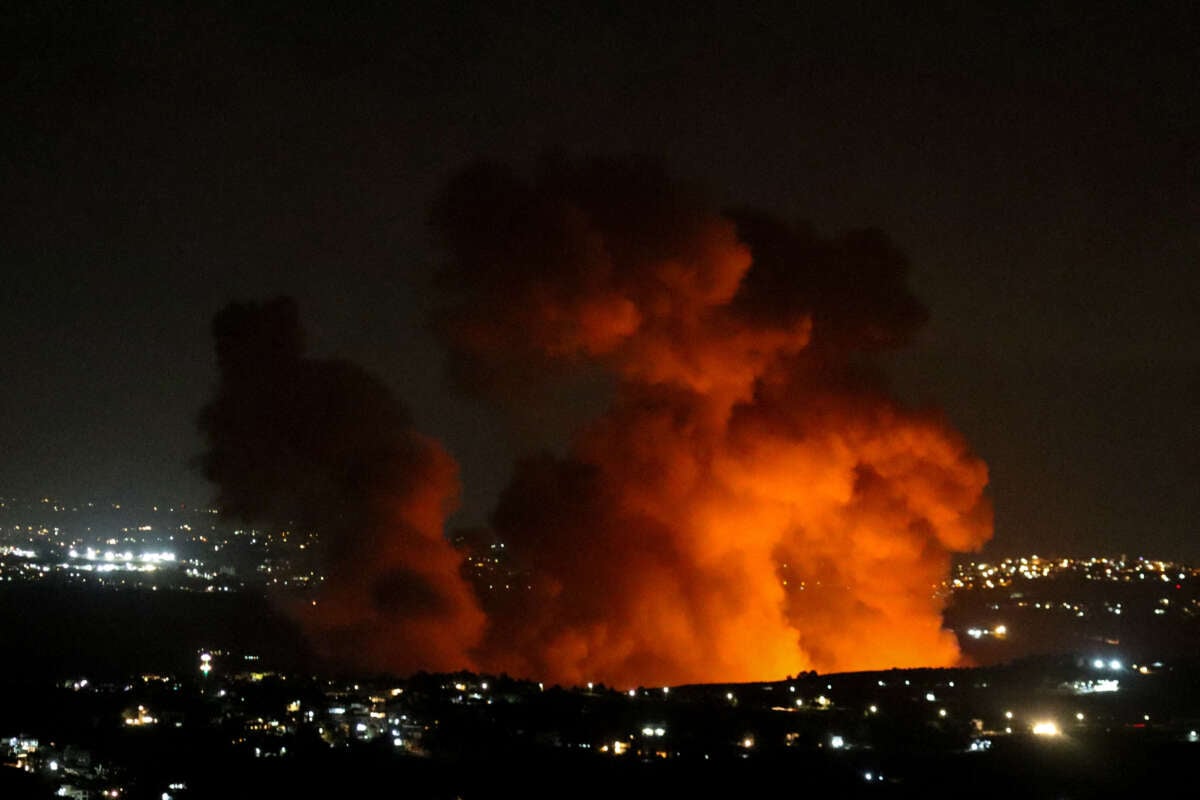Honest, paywall-free news is rare. Please support our boldly independent journalism with a donation of any size.
Israel killed 492 people across Lebanon in a massive bombardment on Monday, Lebanese health officials report, with Israeli forces launching hundreds of airstrikes and ordering forced evacuations across the country as officials signal an intent to occupy large swaths of Lebanon.
Lebanese health officials said that the attacks injured 1,645 people. The Israeli military reported that it has struck 1,100 targets. The strikes were largely focused on southern and eastern Lebanon.
According to Lebanese Health Minister Firass Abiad, Israel’s airstrikes targeted homes, medical facilities and ambulances. Israeli forces also targeted people in cars who were trying to flee the bombardment, he said. The strikes killed 21 children, per initial counts that were rising rapidly on Monday.
Leading up to the attacks, Israel sent tens of thousands of civilians in southern Lebanon messages on their phones ordering them to evacuate from their homes; Israeli forces have ordered residents in the Beqaa Valley to evacuate their homes indefinitely, suggesting that they are planning to carry out more attacks there. In some places, the orders came just hours before Israel launched its strikes, leaving families with little time to flee for their lives.
Israel has essentially admitted that it’s purposefully targeting civilian areas. In their evacuation orders, the Israeli military told Lebanese civilians that they should evacuate areas where Hezbollah, an armed political bloc, is storing weapons. Israel has repeatedly claimed, without evidence, that Hezbollah is storing weapons in civilian areas — but even if this were true, experts have said that there is no way for civilians to know where weapons would be located.
Schools and universities were closed as the Lebanese government prepared shelters for those displaced.
The Israeli military said on social media that it was also targeting Beirut with strikes.
The air raid came after Israel launched a series of attacks on Lebanon last week, killing at least 37 people, including two children, through orchestrated explosions of thousands of pagers and walkie talkies across the country. Over 3,000 people were injured in the attacks that Hezbollah’s leader called a “declaration of war.”
Israel’s recent attacks are the deadliest since the 2006 incursion in which the Israeli military launched a bombardment on Hezbollah soldiers after the group captured several Israeli soldiers amid cross-border attacks. In that incursion, Israeli soldiers killed roughly 1,200 Lebanese people and wounded 4,400, most of them civilians; several dozen Israeli soldiers were also killed.
Israel’s current bombardment of Lebanon appears to be just getting started. Tensions between Hezbollah and Israel have grown amid Israel’s genocide in Gaza, with the groups launching thousands of attacks largely along their shared border, the vast majority of them coming from Israel. These strikes have already forcibly displaced over 100,000 people in southern Lebanon.
Now, Israeli officials are signaling their intent to launch yet another military occupation of Lebanon, using many of the same tactics the Israeli military is using in its genocide of Palestinians in Gaza. (Israel’s last occupation of Lebanon lasted 22 years, with Hezbollah forcing the Israeli military to pull out of southern Lebanon in 2000.)
Israel has adopted a “Gaza-like approach in southern Lebanon,” fellow for the Carnegie Middle East Center Mohanad Hage Ali told The New York Times. Indeed, less than a week into Israel’s vowed “new phase” of its assaults in the region, many of Israel’s tactics have echoed its strategy in Gaza, including the attacks on civilians; the forced evacuations; and the unproven claims that its military is targeting civilian centers that are supposedly storing weapons.
On Saturday, Israeli Diaspora Affairs Minister Amichai Chikli claimed that Lebanon does not qualify as a state and implied that Israel has the right to “take over” parts of Lebanon in which Hezbollah soldiers could fire or have fired rockets into Israel. He also claimed that the “most just” and “moral” thing for Israel to do is to establish a “buffer zone” in southern Lebanon — echoing Israel’s “buffer zone” in Gaza, in which Israel has razed nearly everything and set up a military occupation.
Other Israeli officials have demanded control over the area of Lebanon south of the Litani river — a large area about 18 miles north of the border with Israel, likely signaling Israel’s intent to occupy the region home to hundreds of thousands of Lebanese people.
Israel’s Minister of Education, Yoav Kisch, vowed on Saturday that “Lebanon will be annihilated.”
Update: This story has been updated to reflect the latest numbers from the Lebanese Health Ministry, released at approximately 4:30 pm Eastern Time. The death toll is rising rapidly and this story will no longer be updated.
A terrifying moment. We appeal for your support.
In the last weeks, we have witnessed an authoritarian assault on communities in Minnesota and across the nation.
The need for truthful, grassroots reporting is urgent at this cataclysmic historical moment. Yet, Trump-aligned billionaires and other allies have taken over many legacy media outlets — the culmination of a decades-long campaign to place control of the narrative into the hands of the political right.
We refuse to let Trump’s blatant propaganda machine go unchecked. Untethered to corporate ownership or advertisers, Truthout remains fearless in our reporting and our determination to use journalism as a tool for justice.
But we need your help just to fund our basic expenses. Over 80 percent of Truthout’s funding comes from small individual donations from our community of readers, and over a third of our total budget is supported by recurring monthly donors.
Truthout has launched a fundraiser to add 460 new monthly donors in the next 8 days. Whether you can make a small monthly donation or a larger one-time gift, Truthout only works with your support.
